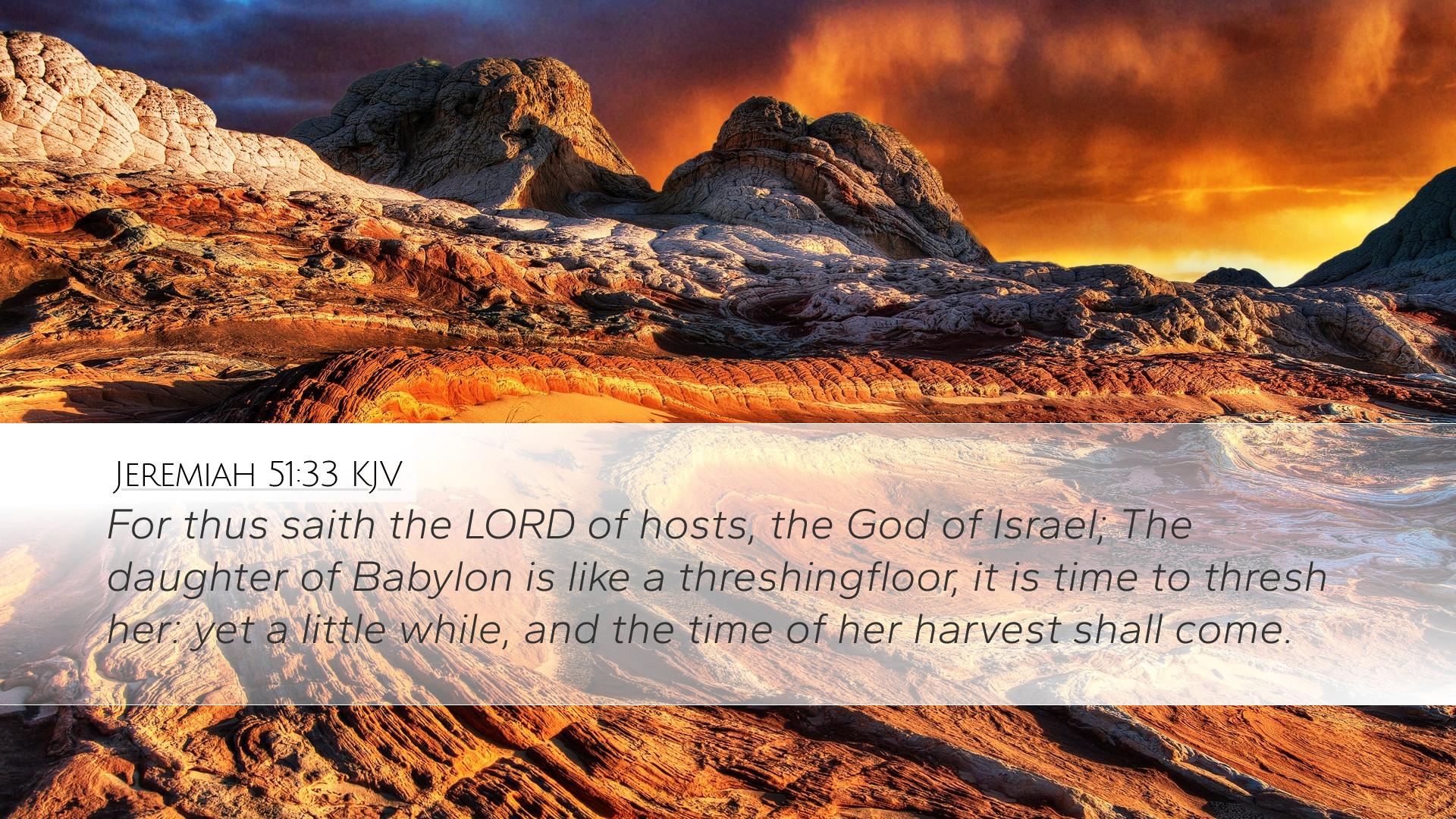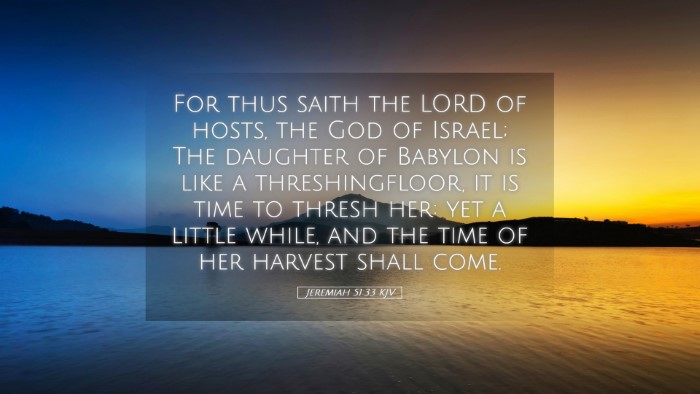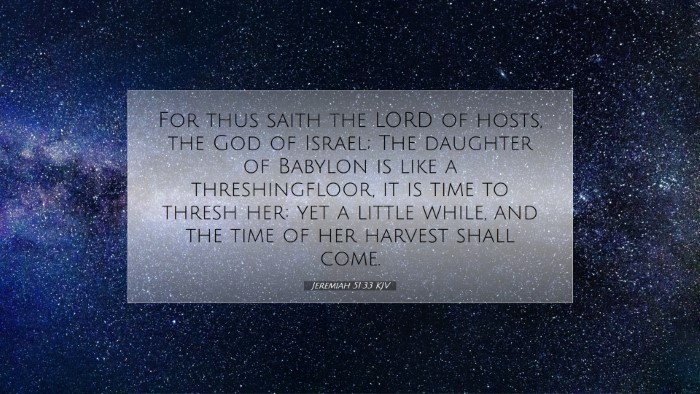Bible Commentary on Jeremiah 51:33
Jeremiah 51:33: "For thus saith the Lord of hosts, the God of Israel; The daughter of Babylon is like a threshing floor, it is time to thresh her: yet a little while, and the time of her harvest shall come."
Introduction
This profound verse from the book of Jeremiah serves as a reminder of God's sovereignty over nations and His divine judgment. The imagery of a threshing floor connects agricultural practices with spiritual truths about judgment and restoration. In this commentary, insights from public domain commentators such as Matthew Henry, Albert Barnes, and Adam Clarke will be synthesized to provide a comprehensive understanding of this passage.
Contextual Background
Jeremiah prophesied during a tumultuous period for the people of Israel, predicting the fall of Babylon, which acted as God's instrument of judgment on His people. However, God also ordained Babylon's downfall, emphasizing the cyclical nature of divine judgment and human sovereignty.
Historical Context
Babylon was a symbol of oppression for the Israelites, and their destruction was a necessary act of divine justice. The Babylonian Empire had exalted itself, and God, through Jeremiah, declared that its time of reckoning was at hand.
Verse Analysis
This verse is rich with symbolism and reflects God's impending judgment on Babylon, which is described as a "threshing floor." Here, the process of threshing serves as a powerful metaphor for the purification and separation that God will execute.
Metaphorical Significance
- Threshing Floor: In agrarian cultures, the threshing floor is where the fruit of the grain harvest is separated from the chaff. This image illustrates a time of divine judgment, where the faithful will be separated from the unfaithful.
- Harvest: The phrase "the time of her harvest shall come" suggests that while judgment is imminent, it is also a time for reaping, indicating that God's plans are not only about destruction but also about eventual restoration and the gathering of His people.
Insights from Commentators
Matthew Henry
Matthew Henry emphasizes God's sovereignty in judgment. He notes that the "daughter of Babylon" signifies not just the city but the nation and its people, highlighting their collective responsibility for their actions against Israel. Henry asserts that God’s divine timing in dealing with Babylon underscores His omnipotence—"it is time to thresh her" illustrates that God has appointed a specific time for divine justice.
Albert Barnes
Albert Barnes focuses on the agricultural metaphor in this text and its implications for understanding God’s action. He explains that the "threshing floor" signifies a time of action, pointing to the inevitability of judgment. According to Barnes, this passage reflects that God is at work even when it appears that evil triumphs. It serves as both a warning and a promise of eventual justice for God's people.
Adam Clarke
Adam Clarke elaborates on the idea of the harvest as a dual metaphor for both judgment and restoration. He notes that while the focus is on God judging Babylon, there exists a remnant of believers who will be restored following the judgment. Clarke’s commentary emphasizes that divine discipline serves a purpose—not solely retribution but also the eventual deliverance and hope of God’s faithful remnant.
Theological Implications
This verse encapsulates key themes in biblical theology, including divine judgment, the justice of God, and the hope of restoration.
Divine Judgment
As noted by the commentators, God's judgment upon nations serves to highlight the accountability of all peoples before Him. The specific imagery of threshing conveys precision in God's judgment, ensuring that nothing escapes His notice.
Justice and Hope
While the text conveys a somber message of judgment, it is also imbued with hope for those who remain faithful. The concept of harvest signifies a future restoration, aligning with God's ultimate plan for salvation that pervades the Scriptures.
Application for Today's Believers
For pastors, students, and scholars, this verse encourages reflection on the nature of God’s justice and the hope found in His promises. It serves as a reminder that while God may seem distant amid tribulation, He is actively present—working toward justice and eventual restoration.
Call to Faithfulness
Believers are urged to remain steadfast in their faith, trusting in God’s timing and justice, even when circumstances appear discouraging. The call is to embody hope amidst trials, mirroring the promise of God’s forthcoming harvest.
Conclusion
Jeremiah 51:33 serves as a multifaceted passage that invites deep theological reflection and application. By synthesizing the insights of Matthew Henry, Albert Barnes, and Adam Clarke, we gain a richer understanding of the themes of divine judgment, justice, and hope in God's redemptive plan. As believers engage with this text, they are reminded of God’s sovereignty over nations and His faithfulness to His people, urging them to trust in His ultimate justice and restoration.


